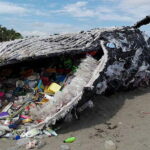Offshore fracking is a controversial practice that involves injecting high-pressure water, sand, and chemicals into shale formations to extract oil and gas. The process has been linked to a number of environmental and health problems, including water contamination, air pollution, and earthquakes.
In recent years, the US government has approved offshore fracking in the Gulf of Mexico, a fragile ecosystem that is already experiencing a number of environmental challenges. This decision has been met with opposition from environmental groups, who argue that offshore fracking poses a serious threat to the Gulf’s marine life, coastal communities, and public health.
The Impacts of Offshore Fracking
A 2014 report by the CHEM Trust found that wastewater from offshore fracking contains a cocktail of hazardous chemicals, including some that are linked to cancer, heart disease, and reproductive problems. The report also found that the EPA does not have adequate oversight of offshore fracking and that many of the chemicals used in the process remain secret.
In addition to the risks posed by wastewater contamination, offshore fracking also raises concerns about air pollution and earthquakes. Fracking operations can release harmful pollutants into the air, including methane, which is a greenhouse gas. Fracking can also trigger earthquakes, as the process can weaken underground formations.
The Center for Biological Diversity Sues the EPA
In response to the Trump administration’s decision to allow offshore fracking in the Gulf of Mexico, the Center for Biological Diversity has filed a lawsuit against the EPA. The lawsuit alleges that the EPA failed to properly evaluate the environmental and health risks of offshore fracking before issuing permits.
The Center for Biological Diversity is seeking a court order to prevent the EPA from issuing any further permits for offshore fracking in the Gulf of Mexico. The Center argues that offshore fracking is a reckless and illegal practice that threatens the Gulf’s marine life, coastal communities, and public health.
The Dirty Scheme
Offshore fracking is a dirty business that poses a serious threat to the Gulf of Mexico and beyond. The Center for Biological Diversity has the right to sue the EPA for issuing permits for offshore fracking without proper oversight.
The EPA must take immediate action to protect the Gulf from the harms of offshore fracking. This includes suspending all permits for offshore fracking and conducting a thorough assessment of the environmental and health risks of this practice.
The public deserves to know what chemicals are being discharged into the Gulf from offshore fracking operations. The EPA must also require oil companies to disclose the full list of chemicals used in fracking fluids.
Offshore fracking is a reckless and illegal practice that must be stopped. The EPA must listen to the concerns of the public and environmental groups and take action to protect the Gulf of Mexico.
Environmental Impacts of Offshore Fracking
- Water contamination: Fracking wastewater contains a cocktail of hazardous chemicals, including some that are linked to cancer, heart disease, and reproductive problems. This wastewater can contaminate drinking water supplies, coastal ecosystems, and marine life;
- Air pollution: Fracking operations can release harmful pollutants into the air, including methane, which is a greenhouse gas. Methane is a major contributor to climate change;
- Earthquakes: Fracking can trigger earthquakes, as the process can weaken underground formations.
Additional concerns
- Secret chemicals: Many of the chemicals used in fracking fluids remain secret. This makes it difficult to assess the full environmental and health risks of this practice;
- Lack of oversight: The EPA does not have adequate oversight of offshore fracking. This leaves the Gulf of Mexico vulnerable to the harms of this practice.
This section provides a concise overview of the environmental impacts of offshore fracking. It also highlights some of the additional concerns that have been raised about this practice.
Conclusion
Offshore fracking is a risky and environmentally destructive practice. The Center for Biological Diversity’s lawsuit against the EPA is a necessary step to protect the Gulf of Mexico and its inhabitants from the harms of offshore fracking.

